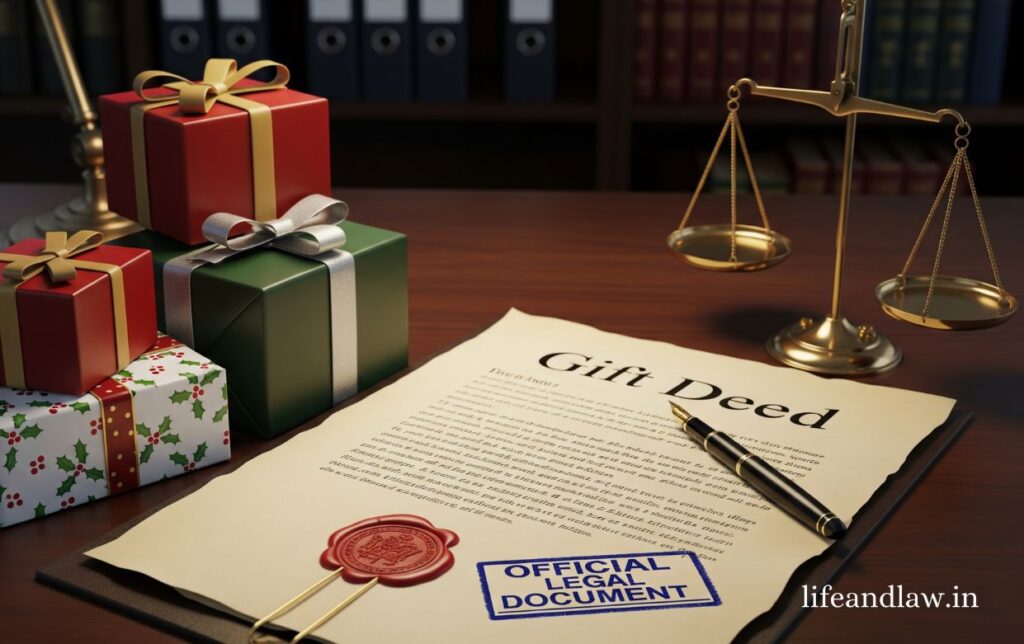Trending

A Gift Deed is a legal instrument in which a donor freely transfers movable or immovable property to a donee without monetary recompense. It necessitates explicit intent, property specifics, and acceptance by the donee.
The aim of this article is to explain what a Gift Deed is, define the legal process for creating one, and emphasise the main requirements and safeguards to guarantee it is legitimate, enforceable, and free of any future legal issues.
a)Section 122: Definition of Gift
A gift is the voluntary transfer of existing property, whether movable or immovable, without remuneration. The donor must make the gift voluntarily, and the donee must accept it while the donor is alive. If acceptance does not occur in a timely manner or if the donee dies before accepting, the gift is rendered void.
Essentials of a Gift Deed
Donor and Donee: Names, addresses, and identification numbers must all be included. The donor must be the lawful owner of the property.
Free Consent: The donor must provide the gift willingly, without compulsion or fraud.
Description of Property: A detailed and specific description is required. For immovable property, include the area, address, and survey number.
Without Consideration: The gift must be free of cost or monetary value.
Witnesses: The deed must be signed by two credible witnesses.
Registration Process: To register the deed, visit the sub-registrar’s office and pay stamp duty and registration charges.
Transfer of Ownership: Once registered and signed, ownership is legally transferred.
Acceptance: The donee must sign and record their acceptance of the gift.
b)Section 123: Mode of Transfer
Immovable Property: A registered document is required, together with the signatures of the donor and witnesses.
Movable Property: Can be transferred through registration or physical delivery.
c)Section 124: Existing and Future Property
Future property gifts are invalid, regardless of whether existing property is included.
d)Section 125: Gift to Several Donees
If one of the several donees denies the gift, it is void for that portion.
e)Section 126: Suspension or Revocation of Gift
A gift can be revocable only under agreed-upon conditions, not at the donor’s will or on legal grounds, providing protection for bona fide purchasers.
f)Section 127: Onerous Gift
If the gift involves both advantages and obligations, it must be unconditionally accepted. If the gifts are separable, the donee may opt to reject the burdened share. A minor donee does not become liable until they achieve legal age.
g)Section 128: Universal Donee
If a donor gives away their entire fortune, the donee is responsible for any associated debts and liabilities.
h)Section 129: Exceptions
Donations Mortis Causa: Gifts given in anticipation of death are exceptions.
Muslim Law: These provisions have no effect on you; you are still subject to personal law.
Drafting a Gift Deed demands legal knowledge and accuracy at all stages. A legitimate Gift Deed offers legal protection, prevents disputes, and facilitates property transfer. Ensure the donor’s intent, the donee’s acceptance, and the presence of witnesses.
Seek legal advice if you are unsure. A qualified lawyer can assure compliance with all relevant rules and secure the transfer effectively. The author of this article Adv. Abdul Mulla is available for consultation at www.asmlegalservices and www.lifeandlaw.in.
Adv. Abdul Mulla (Mob. No. 937 007 2022) is a seasoned legal professional with over 18 years of experience in advocacy, specializing in diverse areas of law, including Real Estate and Property Law, Matrimonial and Divorce Matters, Litigation and Dispute Resolution, and Will and Succession Planning. read more….
Copyright BlazeThemes. 2025